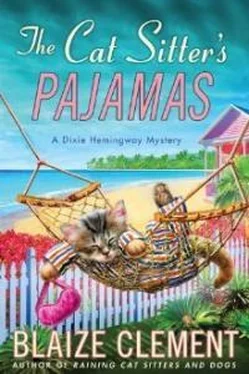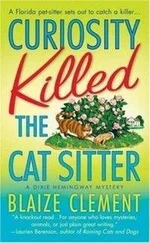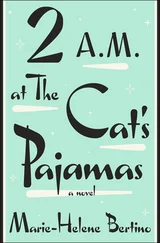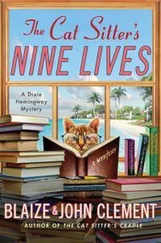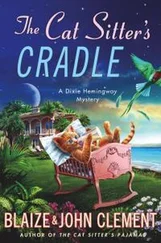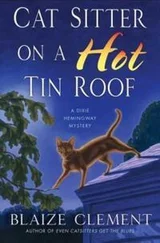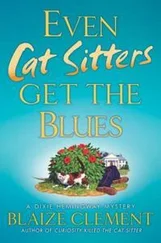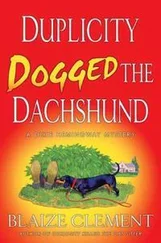I said, “So if Briana got addicted to those chemicals, she would have to find a way to keep her body supplied with them.”
“Exactly. And in Briana’s case, the way opened up like magic. She got noticed, she became a model, then a supermodel, and all the time she was lying about her background. The fear of exposure would give her the same old chemicals she got from breaking into houses. But over time, bodies require more of the old addictive drug to get the same satisfaction. So Briana would have had to do something to increase her fear of being caught.”
“Like stalking Cupcake.”
“That would be my guess. And since he was her companion when her addictions began, she might have got additional satisfaction just by being near him.”
“But why wasn’t Cupcake addicted to the same chemicals? He was breaking into houses with her.”
Dryly, Reba said, “Have I missed something? Isn’t he a famous football player? He has to move fast, be highly alert, be on top all the time, or he’ll lose games and his career. That’s excitement. That’s anxiety. That’s triumph. Those are emotions that create all the old chemicals he knew as a kid breaking into houses. He also got rewarded for doing a good job, so he would have dual addictions. Most people have a lot more than two.”
As if she sensed that I bristled at the idea of Cupcake being an addict, she leaned over and patted my knee. “As I said, Dixie, we’re all addicts. Every person in the world is addicted to several self-created chemicals. Our addictions can be productive and beneficial, or they can be destructive. In Briana’s case, they seem to be self-destructive.”
I thought about how Briana’s and Cupcake’s lives had diverged. Cupcake got recognition for his athletic skills. Briana shot the uncle who’d molested her for years. Cupcake had heard cheers and been offered scholarships. Briana had run away and became an anonymous face among other anonymous faces in the French Quarter of New Orleans. Cupcake had followed a trajectory that led to pro ball and an ability to express his innate generosity by helping underprivileged kids escape the same poverty he’d escaped. Briana had followed a trajectory that led to being a famous model, but instead of helping other young women dealing with abuse and poverty, she’d hung out with criminals. Perhaps Briana had only one addiction—to chemicals that came from flirting with the danger of public exposure.
Without meaning to, I blurted, “I think the investigators know who the murdered woman is, but they’re saying they don’t.”
“You don’t like people keeping secrets from you.”
That’s the problem with shrinks, they always bring it back to you, and what you feel. But she was right, I hate it when I know people are holding back something from me.
“I guess not.”
“Well, that’s the way law enforcement works, isn’t it?”
I didn’t even bother agreeing. We both knew why I hated secrets.
I said, “What do you think I’m addicted to?”
She smiled. “We all have to figure out our own addictions, Dixie, but I think one of your addictions is to chemicals that come from the satisfaction of seeing wrongs righted, justice done. You’ve been that way as long as I’ve known you. It’s why you became a deputy, and it’s why you’ll always have an interest in criminal cases. Luckily for me and Big Bubba, you’re also addicted to chemicals derived from the satisfaction of doing a good job as a pet sitter.”
On hearing his name, Big Bubba yelled, “Whatcha doing there?”
Reba and I laughed, and I felt a ton of weight slide off my shoulders. At least I didn’t have to carry around a false burden of trying to understand things that really didn’t have anything to do with me.
12
When I got home, Michael’s car was in the carport, but I didn’t go inside the house to talk to him. I didn’t trust myself not to blurt out all that had gone on. If I did, I’d create worries for Michael. I chuckled a little bit to myself when I thought what Reba would say about the way Michael worried about me and Paco. With our irresponsible mother, Michael had been protecting me all his life. The poor guy was probably addicted to the chemicals his brain cranked out every time he worried about somebody he loved.
I trudged up the stairs to my apartment, using the remote to raise the electric shutters over my French doors. The sun was directly overhead, but my porch’s roof kept it from being blazing hot. A cardinal couple cooling their feathers on the porch railing watched me open the French doors and go inside. I lowered the shutters over the doors, plunging my apartment back into cavelike dimness. Except for the glass doors, the only light in my apartment comes from a small window over my kitchen sink and a narrow stretch of glass near the ceiling in my bedroom. An AC unit is wedged into an opening cut for it in my bedroom wall.
Shedding clothes like a cat shedding hair, I went straight to the bathroom and stood under a warm shower. Then I pulled on a terrycloth robe and fell into the rumpled bed I’d left that morning at four o’clock. My day had already lasted eight hours, and it had barely started.
I was asleep before I’d got my arms and legs arranged for it. I dreamed I was walking up a narrow mountain trail. On one side of me was a rough mountain wall with granite protrusions I had to duck to keep from hitting. On the other side was nothing, just space. I could see clouds below me, and what looked suspiciously like the moon. I turned a corner, and the trail came to an abrupt end. A red door with shiny gold hinges was set in the mountain face. The door had a golden doorknob. I reached for it, but the door flew open before I touched it, and a narrow red carpet unrolled before me. It marked a passageway to a tall throne at the far end of a cavernous room lit by millions of flickering birthday-cake candles set in little rosebud holders. The candles were pink.
On each side of the carpet were brown frogs in satin livery—white waistcoats and orange pants, and emerald green cummerbunds around their waists. They were frisky frogs, and as I walked forward they leaped and danced like Baryshnikov, clicking their heels together in midair and doffing white satin top hats while they sang in smooth harmony. I could not make out the words to the song because I didn’t speak frog, and my ignorance of the language bothered me. As I got closer to the throne, I could see that a large black frog sat on it. I knew he was a king because he had a gold crown on his head and he was dressed all in white satin—tight pants, fitted vest, white satin cravat knotted at his neck, little white satin ballet slippers on his feet.
I walked to the very end of the carpet and looked up at the king.
He said, “What do you want?”
I said, “Well, sir—”
His bulgy eyes swelled and he yelled, “Do I look like a sir? Don’t be calling me sir, I’m a king!”
So I said, “Forgive me, Your Majesty. I just want to know—”
He said, “You want to know! You want to know! Always you want to know! You always want to know, don’t you?”
I said, “Well, I just—”
“I know,” he said, “you want to know the future. You want to know what’s coming.”
He leaned forward, and his eyes were like big yellow balloons about to pop.
“You know what, sister? You waste all your todays wanting to see tomorrow.”
The other frogs leaped on me, and I shoved at them, struggling to get free.
I woke up kicking and grunting, with my robe twisted around my legs and one of the sleeve edges caught under my body so my arm couldn’t move. My heart was pounding and I was breathing fast and my skin was still puckered from the clammy feel of frog bellies pressed on me.
Читать дальше
